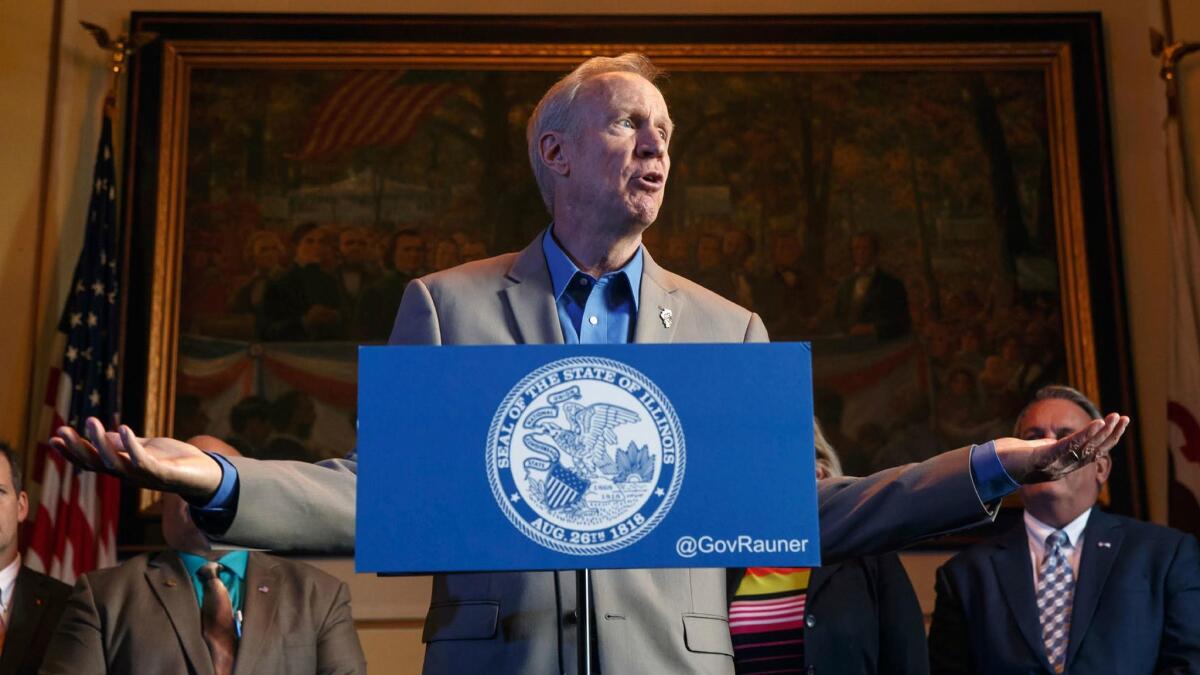Illinois governor vetoes bill to raise state’s minimum wage to $15 an hour

- Share via
Reporting from CHICAGO — Illinois Gov. Bruce Rauner has vetoed a bill that would have raised the state’s minimum wage to $15 an hour by 2022, arguing that it would hurt businesses and ultimately reduce jobs.
Advocates for the wage hike had been anticipating a veto by the Republican governor. The veto kept Illinois from becoming the third state, after California and New York, to adopt a $15 minimum wage.
States and cities have increasingly moved to raise their minimum wages in the absence of federal action on the issue. The federal minimum wage has been $7.25 since 2009.
A number of cities, such as Los Angeles and Seattle, have raised the minimum wage, but some have had to roll back hikes. St. Louis, which recently adopted a minimum wage increase to $10 an hour, must lower it to $7.70 to match the state minimum after the passage of a new Missouri law, which takes effect Monday.
The Illinois bill would have increased the minimum wage, now $8.25 an hour, to $9 in January and gradually stepped it up to $15 by 2022. For part-time or seasonal workers under 18 years old, the raise would have been to $12 an hour. To give small businesses time to adjust, the law offered employers with 50 or fewer workers a credit toward their income tax liability that is proportional to the wage increase.
Lawmakers could attempt to override the veto, but it passed both the House and Senate on May 30 with fewer votes than would be needed. The bill was approved 61-53 in the House and 30-23 in the Senate, and each chamber had two members voting “present.” A veto override would require 71 votes in the House and 36 in the Senate.
“Knowing this was wrong for Illinois he waited to the last minute and, with this veto, Gov. Rauner showed us once again who he is and what his vision is for Illinois: A permanent low-wage economy, where services and infrastructure are slashed, where workers are deprived of dignity and rights and where corporations call all the shots,” SEIU Healthcare Illinois President Greg Kelley said in a statement.
Rauner said in a veto message Friday that “helping low-income families and individuals get out of poverty is a top priority,” but that economic evidence suggests such a big wage hike would hurt workers more than help.
He cited a University of Washington study published this year on the impact of Seattle raising its minimum wage to $13 an hour, as it steps toward $15. That study found the average low-wage worker lost money as employers faced with higher labor costs reduced hours, put off hiring or laid off people. By that study’s measures, the hike would cause Illinois low-wage workers to see a net reduction in earnings of $1,500 per year, Rauner said.
The University of Washington study was criticized by some economists and advocates for methodological problems. Other research has found minimum wage increases lift pay without little or no impact on jobs. Advocates said the minimum wage hike could have increased the pay of 2.3 million people in Illinois.
The Illinois Chamber of Commerce, which opposed the bill as being a “job killer,” applauded the veto.
“Thanks to the governor’s veto of SB 81, Illinois employers can breathe a little easier today,” president and CEO Todd Maisch said. “This keeps Illinois in competition with our neighbors by helping to maintain our jobs and to recruit prospective employers.”
Elejalde-Ruiz writes for the Chicago Tribune.
More to Read
Sign up for Essential California
The most important California stories and recommendations in your inbox every morning.
You may occasionally receive promotional content from the Los Angeles Times.










